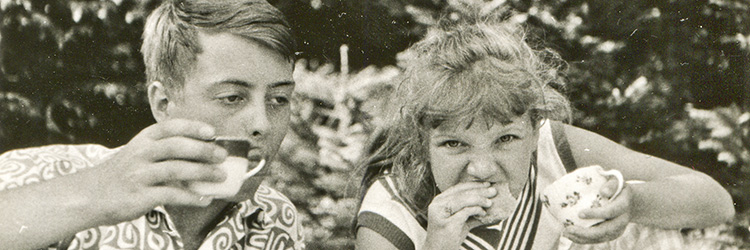
In this blog, Dr Sara Pennell of the University of Roehampton explores the links between taste and memory, and how humans build memories around food. During the Being Human festival Dr Pennell is taking part in Memory Banquet, a series of events about food and memory – centring on a communal meal incorporating different registers of food (ingredients, objects, materials and performance) as memory transmitters, enhancers, and representations of past events.
Remembrance of Cakes Past
A few weeks ago I made a birthday cake for one of the guests of a dinner party thrown by an old family friend. Noticing the cake, which was displayed on the kitchen sideboard, our hostess – a woman in her seventies, who has lived in Britain since 1963 – suddenly launched into reminiscences about the cakes of her Brooklyn childhood.
While recalling at least three different types of chocolate cake from a bakery in her old neighbourhood, her facial expression was not dissimilar to that of the Meg Ryan character in that now-famous dinner scene from the 1989 romantic comedy, ‘When Harry Met Sally’. Clearly, at that moment our hostess (a great cook herself) was remembering not only the look of the cakes, the experience of seeing and buying them in the bakery, but also their taste. We hadn’t even started the meal, let alone tasted the cake, yet she was having a ‘mouth-feel’ memory.
Cake as a tool for memory
My cake wasn’t a chocolate one so wasn’t even a cake-comparator to her remembered, beloved creations, so what was going on here? Cake is a powerful tool for memory, as anybody who has even an inkling of what a madeleine is, knows. One lime-blossom, tea-dunked morsel of this small French delicacy, and Proust’s narrator in the first part of À la recherche du temps perdu experiences a lightning-bolt attack of the flashbacks to his Combray childhood.
It was the taste of the Madeleine that transported Proust’s protagonist back to his past and, (although Proust doesn’t mention this) no doubt so did its smell. Taste is multi-sensory in its workings. My hostess was transported by the mere thought of cake (who among us isn’t?).
Possible triggers for this particular ‘madeleine’ moment were plentiful: the visual appeal of my cake, the event we were celebrating through the cake, the complex physiological processes of appetite fuelled by the anticipation of tasting its sugar- and fat-rich deliciousness, a yearning for a long gone home and the fact that being homemade, my cake was not like the shop-bought ones served up long ago by our hostess’ mother.
In other words, the memories produced by food and of food are not reducible to the taste of a mouthful of crumbs – real or imagined – in early 20th-century France or early 21st-century London. If we had a recipe for one of those Brooklyn chocolate cakes, would the taste of a 2014-version fulfil my host’s yearning?
How we remember food:
As someone who works on historic recipe collections, I suspect that such a cake, however much a facsimile of its 1950s predecessors, would not satisfy memory’s appetite. That appetite is constructed from more than simply the taste and the look of the dish in question, and might be as much about environment and atmosphere (the lovely bakery the cake came from), material culture (the china the cake was served upon), and actors (who the cake was eaten with).
The Proustian madeleine (which was, in an earlier draft rather less memorably, stale toast) and my hostess’s untasted Brooklyn chocolate cake, are forceful reminders that what we remember through food and, no less importantly, what we remember of food and what food does to our memories, is dependent on many things.
These range from how our brains work and are moulded by what we eat, to the geographies of local, national and global food production and marketing; from the cultural structures of everyday lives enmeshed with religious liturgies and traditions, to the chemistry of foodstuffs and the customs of the communities in which we live, work and die. The historic Brooklyn chocolate cake was partly instrumental in making my hostess who she is today. It is a brick in her socio-cultural ‘architecture’ and also as research is uncovering, her neurological architecture.
Memory Banquet
In Memory Banquet, part of the Being Human festival, we want to explore and share some of these strands that tie food to memory as a bodily function, to the processes of memory-making and recalling. The University of Roehampton already hosts the AHRC and Wellcome-sponsored Memory Network (www.thememorynetwork.net), as well as researchers in many aspects of food across the humanities and the life sciences. One of our team members, Nicki Humble, has even written a global history of cake!
From the performative resonances of food to the psychology of appetite, to food texts as memory texts, we are bringing some of this to the table, literally and figuratively, on 15 November at our southwest London campus. We will be drawing on the recovered food heritage of this campus, along with our partner Growhampton, the NUS student-led sustainability and food project, by tracing apple lore from the Old Orchard to the newly planted orchard on the site of a much older 17th-century kitchen garden.
We’ll also be showcasing our many different approaches to food memories – literary, historical and theatrical – in morning taster workshops. The day will round off with a very different, hopefully memorable type of meal – the Banquet itself. Co-curated by food archaeologist Dr Annie Gray and all our academic collaborators, historic and contemporary foods concerned with memory and the brain, will be shared, discussed and digested. So please accept our invitation to the Banquet, but come prepared to remember your food pasts and think about your food in the present.
Memory Banquet is one of many events bringing cutting-edge research in the humanities to a broader audience during the Being Human festival. For updates on that programme and on the festival follow us on Twitter @BeingHumanFest, and on Pinterest. Don’t forget to sign up to our e-newsletter too!
